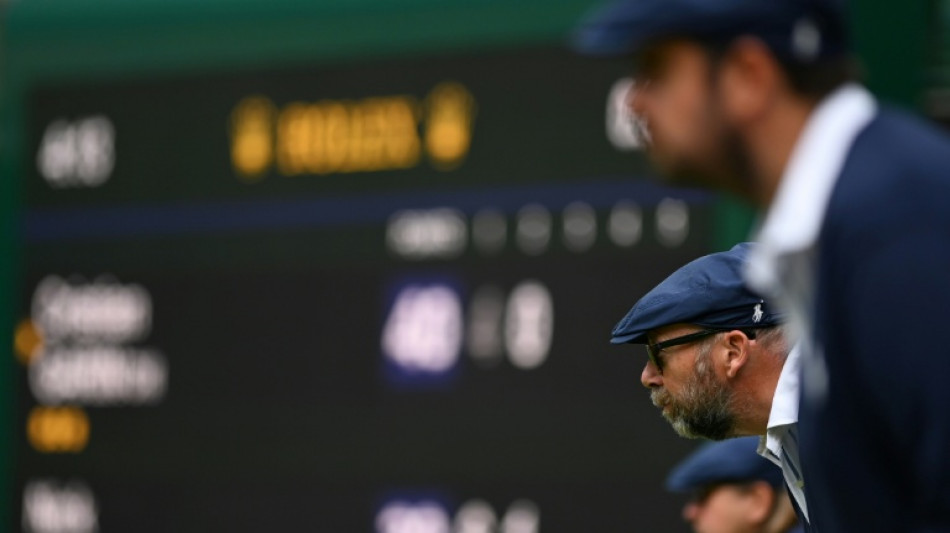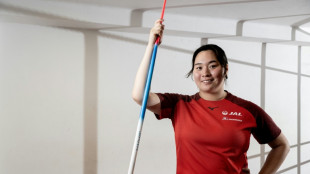
Line judges missed at Wimbledon as AI takes their jobs

Line judges were as much a part of the Wimbledon tennis championships as strawberries and cream. But their demise in favour of technology is being felt by both players and fans alike.
John McEnroe famously ranted and raved at the smartly dressed on-court officials but they have called "out" for the final time and been replaced by an electronic line-calling (ELC) system.
Some players say they find the new calls too quiet while others lament the passing of a 148-year-old tradition at the All England Club in southwest London.
"It was part of the joy of going to Wimbledon -- the tradition. I just used to love it when they all walked out in their uniforms," said company director Fiona Jones, 52.
"Technology is good but I think it's definitely lost something by not having them there," she said, adding that the back of the court now seemed "empty".
Line officials had been working in tandem with technology since 2007.
When the umpire signalled a video replay of a line judge's decision a ripple of excitement would spread through spectators followed by rhythmic clapping as it was shown on the big screen.
Tech worker Marie Sal, 26, said she missed the fun of the audience participation.
It was nice to get a definitive decision quickly, she said, but the "energy, the drama" was now missing.
Last October Wimbledon announced it was finally scrapping its line officials in favour of ELC, following the lead of the Australian Open and US Open, emptying its courts.
"The voice, I cannot really hear it, it is a bit too low," said China's Yuan Yue after her first-round match on an outside court.
"I asked the referee can you (turn) it up a little bit? He said he cannot. I don't really mind, I just want to hear it clearly," she said.
- 'AI took my job' -
More than 450 cameras have been installed to make the decisions previously made by humans.
Those rulings are then relayed via on-court speakers.
American 12th seed Frances Tiafoe said the new technology lacked the theatre and "fanfare" of the old system.
"If I were to hit a serve on a big point, you go up with the challenge, is it in, is it out? The crowd is, like, 'ohhh'. There's none of that," he said.
"If I hit a good serve now and they call it 'out', you may still think it's in, but it doesn't matter. I think that kind of kills it," he said.
The former line judges are not completely redundant.
Around 80 are employed as match assistants, with two on each court offering support to the umpire.
They will also be on hand to resume work should the machines malfunction.
Their plight attracted the support of two English students concerned about the wider threat from artificial intelligence to their own future job prospects.
Gabriel Paul, 26, and Harry Robson, 27, dressed as line judges and held up placards reading "AI took my job" and "Don't sideline humans" outside the gates of the All England Club .
"We're students –- we're graduating in three months and worrying about the whole jobs market," said Paul.
But he said tournament staff had given them a good reception, possibly fearing that they too could be replaced.
"They don't seem to mind. There's been a lot of cheering for us from the stewards," he added.
But Wimbledon is upbeat about the new system, with operations director Michelle Dite saying the introduction of ELC had been "very successful".
"There were one or two players that commented about the audio," she said. "And I think it's really important that we review and monitor that all the time, like we do with everything else."
Y.Robles--HdM

 London
London

 Manchester
Manchester
 Glasgow
Glasgow
 Dublin
Dublin
 Belfast
Belfast
 Washington
Washington
 Denver
Denver
 Atlanta
Atlanta
 Dallas
Dallas
 Houston Texas
Houston Texas
 New Orleans
New Orleans
 El Paso
El Paso
 Phoenix
Phoenix
 Los Angeles
Los Angeles



